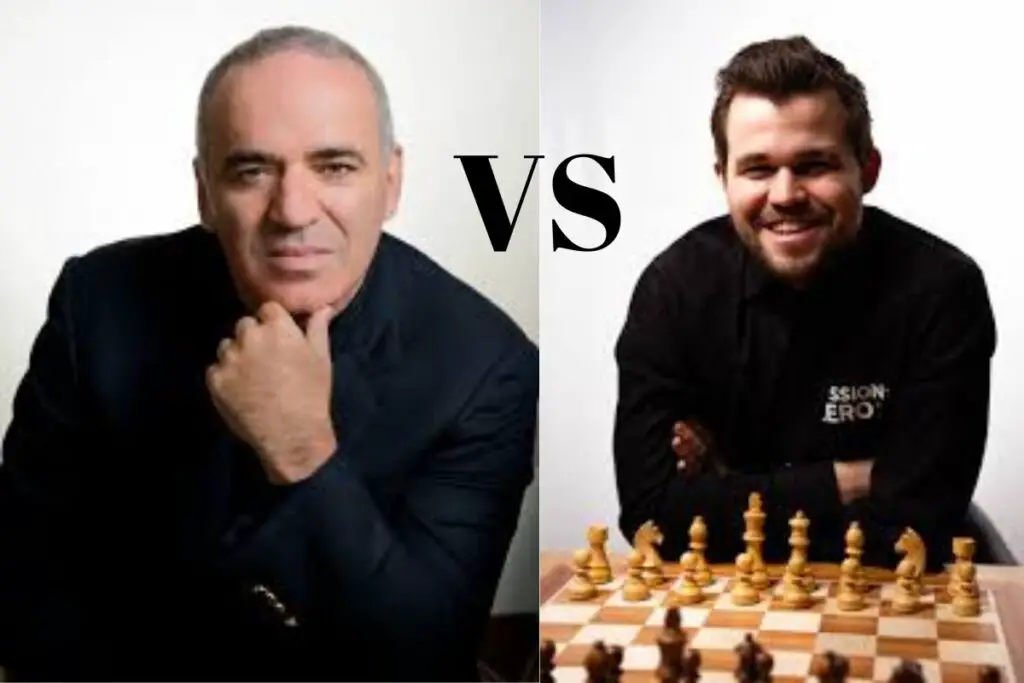These two chess geniuses are among the most talked-about players in the world of chess. Garry Kasparov, the ruthless and strategic former world champion, and Magnus Carlsen, the young and intuitive Norwegian prodigy who has been dominating the game recently.
The thought of these two chess legends facing off is enough to send shivers down any chess enthusiast’s spine. But the question remains: who would come out on top?
In this article, we’ll take a deep dive into the lives, strengths, and weaknesses of Garry Kasparov vs Magnus Carlsen. We’ll explore the tactics they use on the board, the challenges in their careers, and what makes them truly unique.
Kasparov Vs. Carlsen: Strengths and Weaknesses
Let’s dig into their playing styles, talk about what they’re good at, and chat about some weaknesses they’ve shown in their games!
Strengths and Weaknesses of Kasparov
Kasparov is known for his aggressive and attacking style of play. He was a master of tactical play and was able to create complex positions that could often lead to his opponents making mistakes.
He was also known for his excellent endgame skills and won many games from seemingly draw positions.
Despite his many strengths, Kasparov has exhibited some weaknesses on the chessboard. He can sometimes be overly aggressive and overextend himself, leaving him vulnerable to counterattacks.
Another weakness of Kasparov is his difficulty in maintaining focus and concentration for long periods. He is known to lose interest and motivation in games that seem to be heading toward a draw, leading to critical mistakes and losses.
Strengths and Weaknesses of Carlsen
Magnus Carlsen, on the other hand, is known for his intuitive and endgame-focused playing style. He has a deep understanding of positional play and is a master of outmaneuvering opponents with precision and strategy.
Carlsen is particularly strong at finding small advantages and turning them into wins, a trait that has earned him the nickname “The Mozart of Chess.” His ability to calculate variations and visualize future positions is unparalleled, making him a formidable opponent for any player.
Similarly, Carlsen has shown some weaknesses in his playing style. He can sometimes be too cautious and passive, leading to drawn-out uneventful games. This can also lead to time management issues on his part, occasionally running low on the clock and making suboptimal moves as a result.
Kasparov Vs. Carlsen: Career Achievements
Few names are as iconic as Garry Kasparov and Magnus Carlsen. Both players have achieved incredible success throughout their careers, but who has the edge in career accomplishments? Let’s take a closer look at their achievements.
Garry Kasparov’s Career Achievements
Kasparov is widely considered to be one of the greatest chess players of all time. In 1985, he became the youngest-ever uncontested World Chess Champion and held that title for 15 years until Vladimir Kramnik beat him to it in 2000. He was 22 when he earned the title.
Throughout his career, Kasparov won numerous tournaments and matches. He is a six-time winner of the prestigious Linares tournament and has also won the Tilburg tournament five times. In addition, he won the Chess Olympiad with the Soviet Union and Russia multiple times. He’s boasting an impressive CV, right?
Kasparov is also known for his historic matches against the IBM supercomputer Deep Blue. He played against the computer twice, winning the first match in 1996 and losing the second match in 1997.
Magnus Carlsen’s Career Achievements
Magnus Carlsen burst onto the international chess scene in 2004 when he became the youngest player in the FIDE World Chess Rankings at the age of 13. Since then, he has become one of the most renowned players in the world.
Carlsen became the World Chess Champion in 2013 when he defeated Viswanathan Anand in the World Chess Championship. He has successfully defended his title in subsequent matches against Anand, Sergey Karjakin, and Fabiano Caruana.
Carlsen has also won numerous tournaments throughout his career, including the Tata Steel Chess Tournament and the Grenke Chess Classic. In addition, he won the Chess Olympiad with Norway multiple times.
We can say that both players have earned more than enough achievements to get them on top of the game. Carlsen’s career isn’t done yet, so we can’t say for sure whether he’ll manage to get more titles. However, Carlsen reported that he thinks Kasparov is the greatest chess player of all time.
Is Carlsen Better Than Kasparov?
If you’re into chess, you’ve probably heard the debate about who’s better between Carlsen and Kasparov. Some say Carlsen is the better player because he’s had to compete in games with precise engine moves and modern theoretical knowledge, which Kasparov didn’t have to deal with.
But does that necessarily make Carlsen better? We don’t think so. If we take into account the standard of their time, the playing field would be equal. Who has dominated their opponents more? Who has better achievement ratings and more tournament wins? These are all important factors to consider.
Don’t get us wrong; Carlsen is definitely a strong player, but it’s unfair to say he’s automatically better than Kasparov just because he could beat him even in his prime. If Kasparov had lived in the modern era, he might have gathered the same, if not more achievements than Carlsen.
Conclusion
It’s difficult to say definitively who is better between Kasparov and Carlsen. Both are exceptional players who have made remarkable achievements in their respective eras.
While Carlsen may have an edge in terms of strength due to the increased competition and modern advancements in chess, Kasparov’s dominance and achievements in his era cannot be overlooked.
Ultimately, it’s up to personal opinion and preference when it comes to deciding who is the better player. What’s important is that we appreciate the greatness of both players and their contributions to the game of chess!


